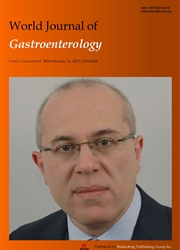

 中文摘要:
中文摘要:
(ICU ) 特别护理联合起来在极其有病的病人的康复是重要的。在过去的十年,在 ICU 接受了好攻击的治疗的许多病人在多重中心开发了 sclerosing 胆管炎。在极其有病的病人(SC-CIP ) 的 Sclerosing 胆管炎是一个相对新的问题。调查 SC-CIP 的原因,临床的表明,治疗,和预后,我们从 2001 ~ 2012 在 PubMed,高空绳索,和 Elsevier 的数据库寻找了出版案例。数据用一种标准形式被提取并且回顾地分析了。与 64 个男人和 24 个女人一起,盖住 88 个病人的 12 合格研究在这分析被注册。吝啬的年龄是 49.8 年。所有从重病病人恢复了,例如损伤,感染,灼伤,和主要手术。高迫使积极结束吐气的压力(偷看,在 12.8 厘米 H2O 的山峰水平) 为所有病人被利用,与 36.3 d 的平均持续时间。另外, vasopressor 代理人在近似 60%of SC-CIP 被管理。cholestasis 的快速的增加和在 intrahepatic 胆汁管的不规则的苛评在下列月内被观察。与 17.9 个月的平均后续经期,差的结果在 54 个病人被观察,包括 34 死亡。在结论,胆汁的树的 ischemic 损害,可以被偷看或 vasopressor 管理影响,影响 cholangiopathic 过程。作为第二等的 sclerosing 胆管炎的一种最新发现的类型, SC-CIP 是在 ICU 的病人的严重进步复杂并发症并且应该被临床医生小心地监视。
 英文摘要:
英文摘要:
Intensive care unit (ICU) is important in the rehabilitation of critically ill patients. In the past decades, many patients who received aggressive treatment in ICU developed sclerosing cholangitis in multiple centers. Sclerosing cholangitis in critically ill patients (SC-CIP) is a relatively new issue. To investigate the causes, clinical manifestation, treatment, and prognosis of SC-CIP, we searched for published cases in the databases of PubMed, Highwire, and Elsevier from 2001 to 2012. Data were extracted using a standard form and retrospectively analyzed. Twelve eligible studies covering 88 patients, with 64 men and 24 women, were mainly reported by German centers. The mean age was 49.8 years. All of the patients recovered from critical illnesses, such as trauma, infection, burn, and major surgeries. High pressure positive end-expiratory pressure (PEEP, peak level at 12.8 cm H20) was utilized for all patients, with the average duration of 36.3 d. In addition, vasopressor agents were administered in approximately 60% of SC-CIE A rapid increase in cholestasis and irregular strictures in the intrahepatic bile ducts was observed in the following months. With an average follow-up period of 17.9 months, poor outcomes were observed in 54 patients, including 34 deaths. In conclusion, ischemic injury of the biliary tree, which may be affected by PEEP and/or vasopressor administration, affects cholangiopathic procedure. As a newly discovered type of secondary sclerosing cholangitis, SC-CIP is a severe progressive complication of patients in ICU and should be carefully monitored by clinicians.
 同期刊论文项目
同期刊论文项目
 同项目期刊论文
同项目期刊论文
 Model based on γ-glutamyltransferase and alkaline phosphatase for hepatocellular carcinoma prognosis
Model based on γ-glutamyltransferase and alkaline phosphatase for hepatocellular carcinoma prognosis Prognosis and Management for Gallbladder Cancer with Hepatic Invasion: Long-term Results of 139 Pati
Prognosis and Management for Gallbladder Cancer with Hepatic Invasion: Long-term Results of 139 Pati Highlights for alpha-fetoprotein in determining prognosis and treatment monitoring for hepatocellula
Highlights for alpha-fetoprotein in determining prognosis and treatment monitoring for hepatocellula Down-regulation of FoxM1 inhibits viability and invasion of gallbladder carcinoma cells, partially d
Down-regulation of FoxM1 inhibits viability and invasion of gallbladder carcinoma cells, partially d Reactive oxygen species generation is essential for cisplatin induced accelerated senescence in hepa
Reactive oxygen species generation is essential for cisplatin induced accelerated senescence in hepa Polymorphisms of glutathione S-transferase genes and clinical outcome of Chinese patients with resec
Polymorphisms of glutathione S-transferase genes and clinical outcome of Chinese patients with resec Emodin induces human T cell apoptosis in vitro by ROS-mediated endoplasmic reticulum stress and mito
Emodin induces human T cell apoptosis in vitro by ROS-mediated endoplasmic reticulum stress and mito Tumor Existence and Tumor Size as Prognostic Factors in Hepatitis B Virus-Related Cirrhosis Patients
Tumor Existence and Tumor Size as Prognostic Factors in Hepatitis B Virus-Related Cirrhosis Patients Prognostic implications of estrogen receptor 1 and vascular endothelial growth factor A expression i
Prognostic implications of estrogen receptor 1 and vascular endothelial growth factor A expression i The prognostic values of 12 cirrhosis relative noninvasive models in patients with hepatocellular ca
The prognostic values of 12 cirrhosis relative noninvasive models in patients with hepatocellular ca miR-34a induces cellular senescence via modulation of telomerase activity in human hepatocellular ca
miR-34a induces cellular senescence via modulation of telomerase activity in human hepatocellular ca Model based on gamma-glutamyltransferase and alkaline phosphatase for hepatocellular carcinoma progn
Model based on gamma-glutamyltransferase and alkaline phosphatase for hepatocellular carcinoma progn Upregulation of Glycoprotein Nonmetastatic B by Colony-Stimulating Factor-1 and Epithelial Cell Adhe
Upregulation of Glycoprotein Nonmetastatic B by Colony-Stimulating Factor-1 and Epithelial Cell Adhe Liver Transplantation Using DCD Donors: The Current Strategy to Expand the Organ Donor Pool in China
Liver Transplantation Using DCD Donors: The Current Strategy to Expand the Organ Donor Pool in China Distinctions Between Clinicopathological Factors and Prognosis of Alpha-fetoprotein Negative and Pos
Distinctions Between Clinicopathological Factors and Prognosis of Alpha-fetoprotein Negative and Pos 期刊信息
期刊信息
